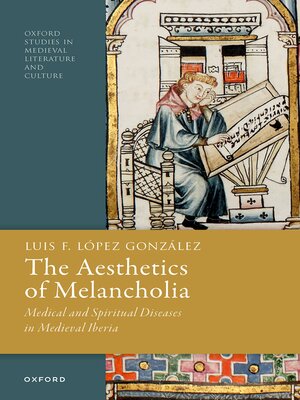The Aesthetics of Melancholia
ebook ∣ Medical and Spiritual Diseases in Medieval Iberia · Oxford Studies in Medieval Literature and Culture
By Luis F. López González

Sign up to save your library
With an OverDrive account, you can save your favorite libraries for at-a-glance information about availability. Find out more about OverDrive accounts.
Find this title in Libby, the library reading app by OverDrive.



Search for a digital library with this title
Title found at these libraries:
| Library Name | Distance |
|---|---|
| Loading... |
This book explores the intersection between medicine and literature in medieval Iberian literature and culture. Its overarching argument is that thirteenth- and fourteenth-century Iberian authors revalorized the interconnection between the body, the mind, and the soul in light of the evolving epistemology of medicine. Prior to the reintroduction of classical medical treatises through Arab authors into European cultures, mental disorders and bodily diseases were primarily attributed to moral corruption, demonic influence, and superstition. The introduction of novel regimens of health as well as treatises on melancholia into academic institutions and into the cultural landscape provided the tools for newly minted authors to understand that psychosomatic illnesses stemmed from malfunctions of the body's biochemical composition. This book demonstrates that the earliest books written in the Iberian vernaculars contain the seeds that effect the shift from a theocentric worldview to a humanistic one. The volume features close readings of multiple texts, including medical treatises and religious writings, and King Alfonso X's Cantigas de Santa Maria, Juan Manuel's Conde Lucanor, and Juan Ruiz's Libro de buen amor. Even though these texts differ in literary genre, rhetorical strategy, and even purpose, this study argues that they collectively employ humoral pathology and melancholic discourses as a means of underscoring the frailty and transience of human life by showing how somatic conditions sicken the body, mind, and soul unto death.







